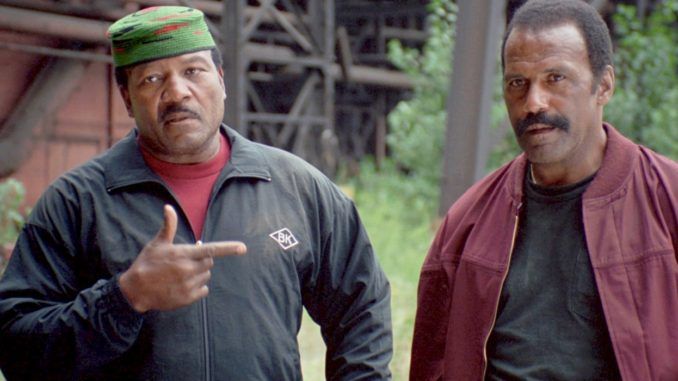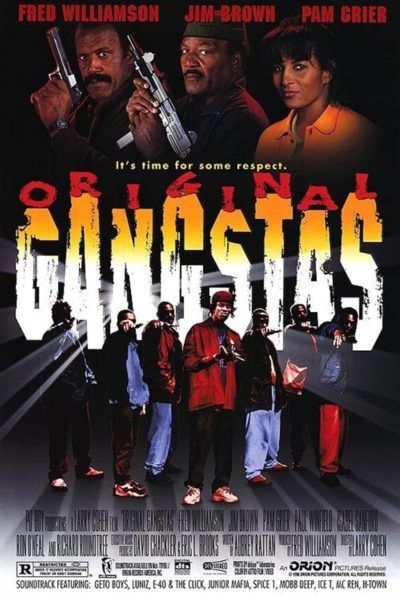
Rating: C
Dir: Larry Cohen
Star: Fred Williamson, Jim Brown, Pam Grier, Paul Winfield
Though both Wikipedia and the movie itself credit Cohen alone as the director, the IMDb lists Williamson as an uncredited co-director. I’ve not been able to find out the specifics there, but it’s clear this was a passion project for Fred, since he was the producer, and was also born in Gary, Indiana, the former steel town where events take place. He also tried to get a sequel into production, Original Gangstas 2: Old School Gangstas, but a 2014 Kickstarter campaign fell well short of the $1.2 million target. You’d think it’d make more sense for someone like Williamson to be the director, given his background in the blaxploitation genre, rather than a nice Jewish boy like Cohen, in his final directorial credit. But early on in his career, he’d directed Williamson in Black Caesar, so Cohen had form.
No argument about the cast, which is basically a Who’s Who of famous black actors from the seventies. As well as the ones listed, you can add Isabel Sanford, Richard Roundtree and Ron O’Neal (plus honkies like Charles Napier and Wings Hauser). They all come together to reclaim their city, after the steel mills close, and it collapses into poverty and crime, with the Rebels gang establishing a reign of terror. When a young man is gunned down in a drive-by, and a store owner sent to hospital, the latter’s son, John Bookman (Williamson) returns. He had been one of the Rebels’ founders, back when they were a protection society, and is appalled by what they’ve become. He joins with the young man’s parents, Jake (Brown) and Grier, to end the violence – one way or another.
 It all starts well enough, and watching the veteran actors ply their craft is a pleasure to watch. Indeed, that might be the problem, in that the film falls in love with them a bit too much. There’s nobody on the other side with quite the same screen presence, even though the film did hire a good number of genuine gang members. Cohen was impressed by them: “They were always on time. They did everything they were asked to do. You know, if you wanted to shoot them and have them fall down, they did falls. They did anything you asked, and they were very friendly to me. They used to come to my trailer and bring me Famous Amos cookies, things like that.”
It all starts well enough, and watching the veteran actors ply their craft is a pleasure to watch. Indeed, that might be the problem, in that the film falls in love with them a bit too much. There’s nobody on the other side with quite the same screen presence, even though the film did hire a good number of genuine gang members. Cohen was impressed by them: “They were always on time. They did everything they were asked to do. You know, if you wanted to shoot them and have them fall down, they did falls. They did anything you asked, and they were very friendly to me. They used to come to my trailer and bring me Famous Amos cookies, things like that.”
As a result of this imbalance, the film isn’t able to sustain itself completely, with the second half becoming a series of interludes between the occasional moment of interest, such as the makers genuinely blowing up a city block in Gary. I was also underwhelmed by the film’s use of Grier, perhaps the biggest name ever in blaxploitation. Renowned as an early action heroine, in a way few white actresses did at the time, she’s largely limited to teaching the local folks self-defense. Foxy Brown snorts derisively at that. Still, nobody gets to over-shadow The Hammer, do they?
